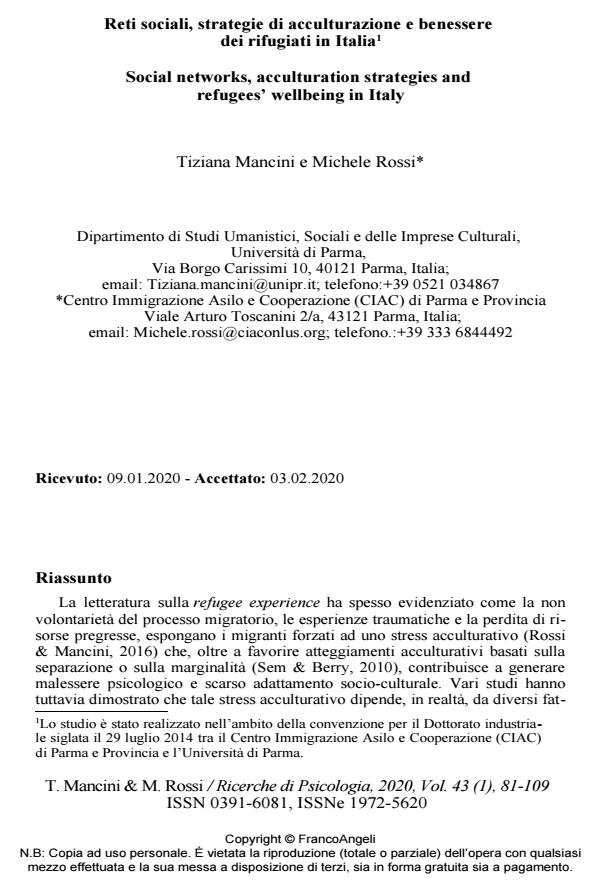Reti sociali, strategie di acculturazione e benessere dei rifugiati in Italia
Titolo Rivista RICERCHE DI PSICOLOGIA
Autori/Curatori Tiziana Mancini, Michele Rossi
Anno di pubblicazione 2020 Fascicolo 2020/1
Lingua Italiano Numero pagine 29 P. 81-109 Dimensione file 321 KB
DOI 10.3280/RIP2020-001005
Il DOI è il codice a barre della proprietà intellettuale: per saperne di più
clicca qui
Qui sotto puoi vedere in anteprima la prima pagina di questo articolo.
Se questo articolo ti interessa, lo puoi acquistare (e scaricare in formato pdf) seguendo le facili indicazioni per acquistare il download credit. Acquista Download Credits per scaricare questo Articolo in formato PDF

FrancoAngeli è membro della Publishers International Linking Association, Inc (PILA)associazione indipendente e non profit per facilitare (attraverso i servizi tecnologici implementati da CrossRef.org) l’accesso degli studiosi ai contenuti digitali nelle pubblicazioni professionali e scientifiche
La letteratura sulla refugee experience ha spesso evidenziato come la non volontarieta del processo migratorio, le esperienze traumatiche e la perdita di risorse pregresse, espongano i migranti forzati ad uno stress acculturativo (Rossi & Mancini, 2016) che, oltre a favorire atteggiamenti acculturativi basati sulla separazione o sulla marginalita (Sem & Berry, 2010), contribuisce a generare malessere psicologico e scarso adattamento socio-culturale. Vari studi hanno tuttavia dimostrato che tale stress acculturativo dipende, in realta, da diversi fat tori e, tra questi, anche dalle risorse personali, sociali e contestuali a cui i migranti forzati possono attingere una volta arrivati nel contesto ospitante (Rossi, 2018). Focalizzandosi in particolare sulle risorse sociali, questo studio ha analizzato come la frequenza dei contatti, l’eterogeneita culturale e la vicinanza emotiva della rete sociale nel paese di approdo si connette agli atteggiamenti di acculturazione e al benessere psicologico dei migranti forzati in Italia. Ad un campione di 160 migranti forzati (gia titolari di protezione = 111; Maschi = 127, Meta = 29.96) e stato somministrato uno strumento basato sul Name generator, l’Acculturation Attitudes Scale e il Kessler Psychological Distress Scale. La path analysis mostra che, favorendo un atteggiamento acculturativo basato sull’integrazione, sono soprattutto l’eterogeneita culturale e la vicinanza emotiva della rete sociale ad associarsi al benessere psicologico dei migranti.
Parole chiave:Esperienza di rifugiati, reti sociali, acculturazione, benessere, migranti forzati.
- Digital Communication at the Time of COVID-19: Relieve the Refugees’ Psychosocial Burden and Protect Their Wellbeing Tiziana Mancini, Chiara Imperato, Silvia Vesco, Michele Rossi, in Journal of Refugee Studies /2022 pp.511
DOI: 10.1093/jrs/feab082 - Migrazioni e psicologie. Introduzione al Forum Alessandro Antonietti, Antonella Marchetti, in RICERCHE DI PSICOLOGIA 1/2020 pp.13
DOI: 10.3280/RIP2020-001002 - The experience of a multidisciplinary team in welcoming vulnerable migrants in a rural Italian reception centre: a study using multidimensional textual analysis Mariachiara Figura, Gianluca Pucciarelli, Silvio Simeone, Paola Arcadi, Bartosz Uchmanowicz, Ercole Vellone, Rosaria Alvaro, in BMC Nursing 957/2025
DOI: 10.1186/s12912-025-03588-7 - The relationship between acculturation and relevant correlates for Sub-Saharan and North African-born migrants: A meta-analytic review Christine Deslandes, Leah M. Kaufmann, Joel R. Anderson, in International Journal of Intercultural Relations 101928/2024 pp.101928
DOI: 10.1016/j.ijintrel.2023.101928 - Living in a multicultural context: Health and integration from the perspective of undocumented Mediterranean migrants, residents, and stakeholders in Italy. A qualitative‐multimethod study Mariachiara Figura, Paola Arcadi, Ercole Vellone, Gianluca Pucciarelli, Silvio Simeone, Loredana Piervisani, Rosaria Alvaro, in Journal of Advanced Nursing /2024 pp.3382
DOI: 10.1111/jan.16036
Tiziana Mancini, Michele Rossi, Reti sociali, strategie di acculturazione e benessere dei rifugiati in Italia in "RICERCHE DI PSICOLOGIA " 1/2020, pp 81-109, DOI: 10.3280/RIP2020-001005